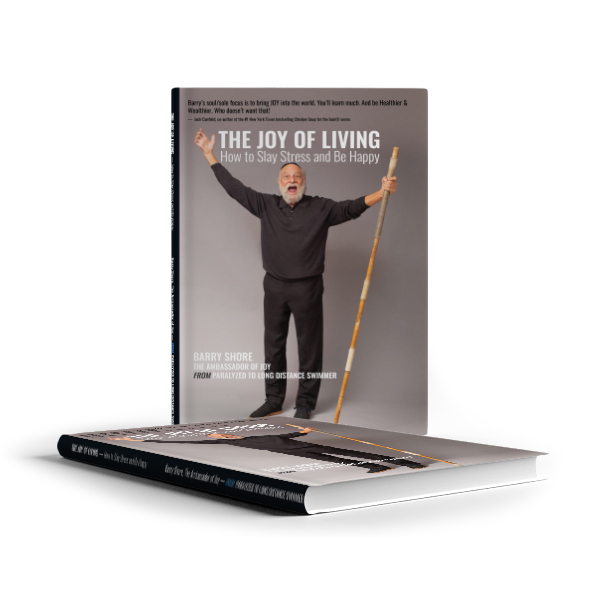Share This Episode

Embracing Joy in Everyday Life: Insights from Yasmine Saad
In this insightful episode of ‘The Joy of Living’ podcast, host Barry Shore welcomes special guest Yasmine Saad to explore the profound topics of self-awareness, spiritual alignment, and the pursuit of a fulfilling life. Yasmine shares her wisdom on how understanding our thoughts and emotions can lead to a deeper connection with our inner selves. Join us as we delve into the importance of recognizing one’s values, the journey towards alignment, and the transformative power of embracing joy in everyday living.
Listen Here (click here to watch episode)
Show Notes:
This episode is brought to you by BetterHelp.
Give online therapy a try at betterhelp.com/JOYOFLIVING
and get on your way to being your best self.
[10.59] Understanding Your Mind
- Many people struggle to comprehend their thoughts and emotions.
- They often either accept them at face value or attempt to suppress them.
- Your thoughts originate from innate sources within you.
- Your mind’s purpose is to problem-solve and create positive outcomes for you.
- When thoughts arise, consider them as inner guidance.
- People may wonder, “So when my mind tells me I’m not good enough, it’s actually guiding me!?”
- Your thoughts require decoding.
- Just as you recognize your dreams hold deeper meanings, so do your thoughts.
- Thoughts are akin to your dreams.
- Every thought and emotion holds a wealth of wisdom for you.
- If you experience pain in your thighs, it’s a signal to pay attention and take action to restore balance.
- Think of thoughts as your constant guiding operating systems.
- It’s crucial to understand this, as many perceive the mind as an adversary and label their emotions as negative.
[14.40] Family Situation & Understanding Yourself
- Two people are involved in the same car accident.
- One of them develops PTSD, while the other does not.
- This phenomenon is observed even in identical twins.
- What causes one person to develop PTSD while the other does not?
- There’s an internal factor at play that determines what affects us.
- I personally experienced war, bombs, and various hardships.
- What affected me most was my concern for my mother’s well-being.
- If I recall my deepest fear, it was about my mother’s health.
- What enters our minds is connected to who we are and what matters most to us.
- While the environment and culture can influence us, it ultimately goes through our personal filters.
[18.02] Specific Age or Time to Explore Oneself
- Developmentally, adolescence marks the beginning of this self-exploration journey.
- It’s a time when you’re no longer a child but in the process of transitioning.
- Whenever something in your life isn’t stable, that’s when the urge to delve into self-discovery arises.
- When something internally feels unstable, it’s like an internal alarm calling your attention.
- For some individuals, adolescence doesn’t occur during their teenage years.
- It might happen later, perhaps in their twenties or beyond.
- I believe that everything unfolds for a reason, and there’s a synchronicity to it all.
[24.48] Deciding What Your Thoughts and Emotions Can Be
- Currently, there’s a prevailing emphasis on controlling thoughts and emotions, particularly towards cultivating positivity.
- However, I believe there’s something more significant that has already been decided for you.
- Thoughts come your way for a reason, and it’s valuable to decode them to determine what’s best.
- For instance, suppose you often think you’re not good enough, and you decide to counter this by affirming your self-worth daily.
- Over time, you’ll start feeling good enough because we become what we tune into.
- What’s lacking in this approach is recognizing the wisdom that the belief “I’m not good enough” holds for you.
- Consider this: If you keep telling yourself that you’re not good enough and criticize yourself, you already possess substantial self-awareness.
- You understand where you currently stand and where you aspire to be.
- By acknowledging your perceived shortcomings, you’re implicitly defining what “good enough” means to you.
- Patient Story [26.45] to [28.01]
- Remember, every thought and every emotion carries the blueprint of your inner world.
[30.53] Outside: Super Achievers – Inside: Not Feeling Worthy Enough
- I often observe this phenomenon when people feel somewhat disconnected from themselves.
- It serves as a signal indicating that there is so much untapped potential within them.
- They are aware of this potential, and that’s why they pay attention to those thoughts.
- Unfortunately, as a society, we tend to motivate ourselves with negativity.
- I always think that if you hold such thoughts, it’s actually a positive sign because it indicates that deep within, you recognize the existence of a better, promising future.
[33.38] Self-Talk
- What’s even more important is the distance between you, your thoughts, and your self-talk.
- This distance allows for observation, and it’s within that observation that learning occurs.
- The challenge arises when people become fused with their self-talk or thoughts.
- When they think something and immediately feel something, there’s little room for change.
- High achievers are often focused on what more could be, but they miss the opportunity to reflect on what already exists in the gap.
- Consequently, it can lead to the belief that everything they’ve accomplished is unworthy, and only what lies ahead holds value.
- The distance between ‘I am here’ and ‘I could be there’ vanishes.
- It’s not a matter of ‘I am here, and I want to figure out how to get there.’
- Instead, it’s the perception that ‘this doesn’t exist,’ which is not useful because they become one with their thoughts.
[38.27] Wisdom
- Living a fulfilling life occurs when you are deeply aligned with your core self.
- Each of us arrives in this world with a unique mission and purpose, yet many remain unaware of what that is.
- Our connection to what we enjoy and what we desire is profound.
- When we analyze our preferences and desires, we often find interconnected themes.
- Personally, I can engage in discussions about self-awareness indefinitely; it’s a source of great inspiration for me.
- Everyone has their own set of values, and when they align with them, they experience a profound sense of well-being.
- High achievers tend to be driven and have a strong desire to reach their full potential, often aiming for a 10x improvement.
- Whenever you engage in activities that propel you towards your 10x self, you will experience something unique.
- The key question to consider is: What do you value?
[47.26] Spiritual Alignment
- Our objective is to achieve alignment.
- When you are aligned, you enter a state of grace.
- My approach focuses on delivering an inner message to guide people toward alignment.
- It involves highlighting where they are headed in the right direction and where they may have strayed.
- When you achieve alignment, you’ll notice a significant shift in your emotions.
What’s your most fervent desire?
My most fervent desire is to impact a billion people in a second
Insider Tips:
Studies have shown that academic performance and health insurance go hand in hand. Children who have health coverage miss fewer classes and perform better in school than those who are uninsured. Additionally, they are more likely to complete high school and graduate college. Routine medical visits are a vital part of keeping kids safe and protected as they start the new school year and participate in extracurricular activities.
Nationwide, millions of school-aged children and teens qualify for free or low-cost health coverage through Medicaid and the Children’s Health Insurance Program (CHIP), but do not have coverage. For eligible children, Medicaid and CHIP can provide access to routine and emergency care, vision care, dental visits, mental and behavioral health services, immunizations, prescriptions, and more. Medicaid and CHIP enrollment is open year-round, and coverage must be renewed annually. Each state has a Medicaid and CHIP program that provides health insurance for children up to age 19 in families with low and moderate incomes. Eligibility varies by state and generally depends on how many people are in a household and family income; in most states, a family with income up to $60,000 per year (for a family of four) may qualify.
Topics Covered:
- What are Medicaid and CHIP?
- What types of services are covered by Medicaid and CHIP?
- Who is eligible for these programs?
- Why is it so important for students to have health coverage?
- How can families with eligible children enroll in coverage? Where can they find help?
- Is there an enrollment period for these programs?
- We’ve heard a lot in the past months about people with Medicaid losing coverage. How can families who have Medicaid or CHIP prevent losing coverage for themselves or their children? Where can they find help?
- Once a child is covered by Medicaid or CHIP is there anything parents need to do to maintain coverage? Is there a renewal process?
- Where can I find additional information?
To get more information, call 1-877-KIDS-NOW (1-877-
Important Links:
About Yasmine Saad
Dr. Yasmine Saad is a highly acclaimed NYC psychologist, 2x international best-selling author, and Forbes-recognized peak performance coach for impact-driven leaders alongside Tony Robbins. Known as The Wise Psychologist, she has pioneered the Inner Message Approach™, helping individuals decode their thoughts and emotions to break free from negative patterns and unlock their true potential.
[bctt tweet=”Developmentally, adolescence marks the beginning of this self-exploration journey.” username=”ambassador4joy”]
THIS SHOW BROUGHT TO YOU BY ORGANIFI
use code LIVING for 20% off your next order

